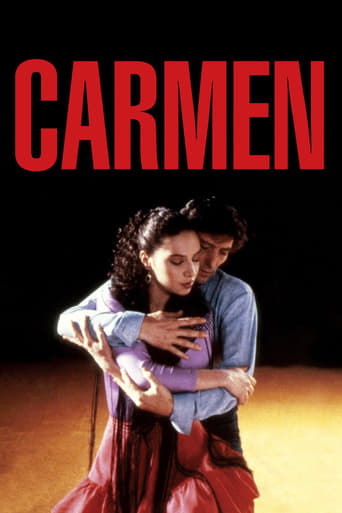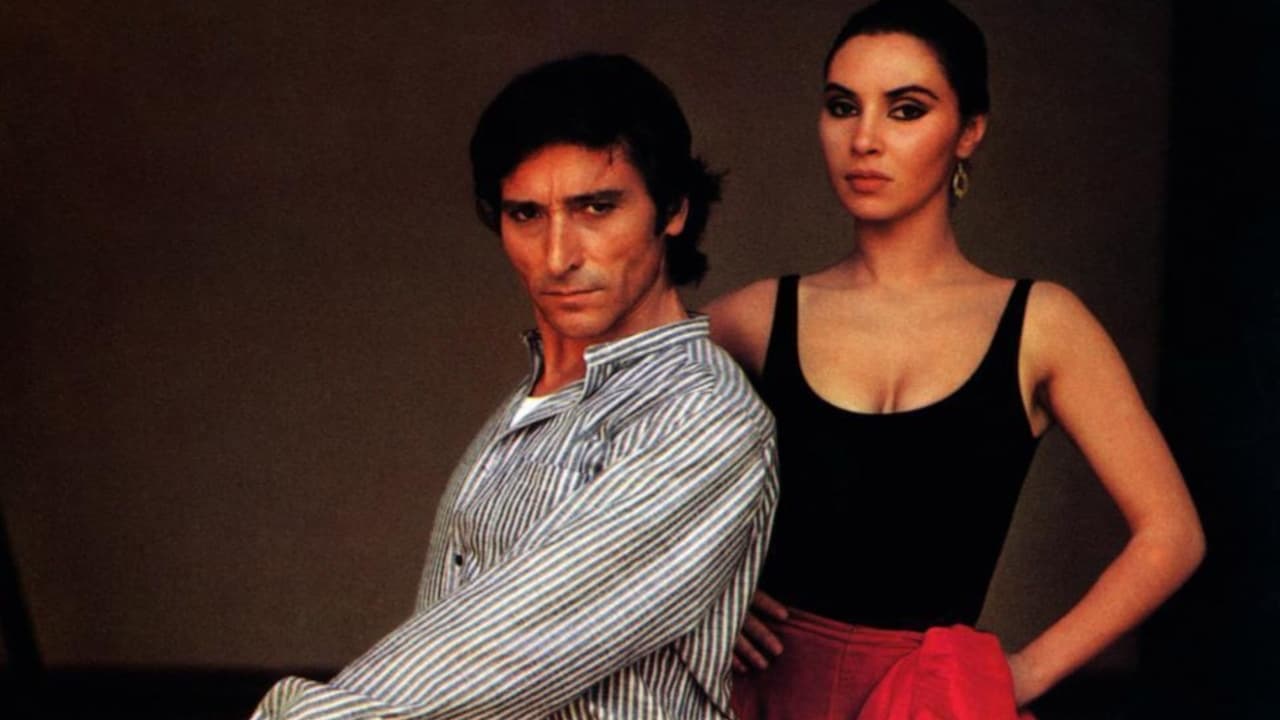chaos-rampant
I'm not a fan of opera, I prefer a mobile eye, a shifting stage of appearances. So I expect those more versed than me to be able to mine this for more interesting insights in the story.I'm drawn here by two things primarily, looking for how they intersect. One is the dance, here wonderful flamenco. There's something silly when men dance it, but the women were a profound joy. There's none of the mannered formalism that you find in the European ballroom, here it's all stirred from explosive blood, urges push through and swirl on the dancing bodies. So this captivates purely for the expressive dance.The other is self-referential illumination on precisely this reality of the urges beneath the act. Dance isn't just bodies moving, though that's what we come to see. There's always something antecedent to it that animates the desire, in the original gypsy world of flamenco I suppose this was marginalization, poverty, lawlessness, it comes down to an anger, passion or pride that can't be reasoned and is let out in abstract shape. Here we have a flamenco staging about a flamenco staging of Carmen become animated by the same tumultuous passions in the opera. The inner Carmen story blurs in the outer Carmen which is about staging Carmen with a real passion, thus enlarging the stage to encompass the life that gives shape to it. So when Carmen and her rival in the troupe dance out their rivalry, or Carmen and her instructor dance out the seduction, we have a richer, more dangerous life than the opera or dance could afford.Saura had made another exercise prior to this and what looks like a few more, mixing dance with a story about the urges. It's smarter to notice than powerful to watch, because it's sparse and feels like a sketch. We see him perfect the co-mingling of story while figuring out the space.It all comes together with superb clarity in his Tango film.
MARIO GAUCI
This is one of a number of Saura efforts celebrating various types of Latin dances (of which I own 5!), but only the first I have checked out. Nominated for the Best Foreign-Language Film Oscar, it details the vicissitudes behind a flamenco dance company's staging of Georges Bizet's famous opera "Carmen" based on the Prosper Merimee' novel. For the record, I own as many as 9(!) adaptations of the source material – of which the 1920 (by Ernst Lubitsch), 1948 (Charles Vidor), 1954 (Otto Preminger), 1962 (Carmine Gallone) and 1984 (Francesco Rosi) are still unwatched.Needless to say, being no fan of either opera or dance, I can only stick with them when briefly incorporated into a movie narrative – or, as happens to be the case here, are presented in the manner of the tried-and-true "putting-on-a-show" formula. In that respect, it adheres to pretty much all of the established tropes of the sub-genre: the girl cast in the title role on the strength of her ideal temperament is a non-starter at first and, naturally, incurs the jealousy of the company's star attraction (past her prime and basically relegated to being a co-choreographer with the director/male lead, himself not so young anymore!); the latter, then, has a turbulent relationship with his new protégé (married to an estranged drug dealer just out of prison and an unrepentant wanton to boot!) – which threatens the production and, ultimately, brings about his personal downfall.Clearly the film's mainstay for the casual viewer is the way the plot line being 'dramatized' becomes mirrored in reality: apart from the male lead's afore-mentioned double-duty, rather unsubtly, the female protagonist shares her name with that of the character she is 'interpreting' – making this turn-of-events somewhat predictable. Having said that, the occasionally exhilarating dance sequences and the protagonists' charisma eventually save the day.
Howard Schumann
The amazing grace and power of flamenco has never been on more vigorous display than in Carlos Saura Carmen, the second of the Spanish director's flamenco trilogy that includes: Blood Wedding (1981), Carmen (1983), and El Amor Brujo (1986). Although the epitaph for movie musicals has now been written, there was never one more alive than this soaring dance interpretation of Bizet's opera based on the novella by Prosper Merimee. Winner of the BAFTA award for Best Foreign-language film and nominated for an Oscar in the same category, in Carmen, Saura attempts to expand the limited vision of the French opera into a deeper and more artistic example of Spain's national identity. Supported by performances by Spain's great guitarist Paco de Lucia and familiar songs by Bizet such as Toreador's March, La Habanera, and the lovely Intermezzo, the film bursts with energy and sensuality.Shot in Gades' dance studio in Madrid, the film is marked by riveting performances by Antonio Gades, former director of the National Ballet of Spain, Cristina Hoyos, an acclaimed flamenco dancer, and singer and dancer Laura del Sol in her first leading role. Carmen opens with the director of the dance company (Gades) rehearsing for a dance production of the opera. He is searching among his students for a young dancer to play the lead role but has not found one that suits his ideal. According to Gades, he wants a girl with "a wild and strange beauty, her lips full and well shaped, opening onto small teeth, whiter than the whitest pearls, her long, black, shiny hair with blue glints similar to a raven's feathers, and eyes with a voluptuous but surly expression." It is only when the director/choreographer travels to a similar studio in Seville that he finds his Carmen, played by the dark-haired del Sol. The film then moves seamlessly between the rehearsals of the company for its new production and the lives of the dancers, reflecting the story of the opera in an almost surreal way that blurs the distinction between illusion and reality. The teacher becomes personally involved with his student but finds that she is elusive, self-absorbed, and proud of her independence. When he discovers, however, that she is married and her husband has just been released from prison after serving a sentence on a drug-related charge, his possessiveness turns into a destructive jealousy that ends the film on a melodramatic tone.Some of the most memorable scenes in Carmen include Gades dancing the Ferucca in his own home as his lover sees him through his window, then, once inside, watches while he performs a full routine. Another remarkable sequence is the dance between Gades and Christina that depicts the male-female relationship with elegance and grace. Though the performance by del Sol captures Carmen's fiercely independent streak, for me she seems a bit too wholesome to be fully convincing as a jezebel, leaving the tragic resolution of the story feeling unmotivated. Whether or not you find the drama convincing, however, ultimately the film is not about the story but about the passion and breathtaking art of the dance. Carmen is a powerful experience that can evoke in the viewer an unexpected feeling of wonder
wedge_graylion
great dancing, great music, great story. I saw it when it came out originally and dubbed into German, so my memory is a bit hazy, but it was very impressive. The story of the opera repeats itself in a production. All is shot very minimalistic, nearly just one set. It's stark, nearly monochrome and very intense because of that. Raw aggression and fury in the cigarette factory scene for instance. This one stands out most clearly in my memory 21 years after I've seen it.Guitar by Paco de Lucia, again very minimalist. I don't know whether there is a DVD available but I will start looking for one ;-)


 AD
AD





